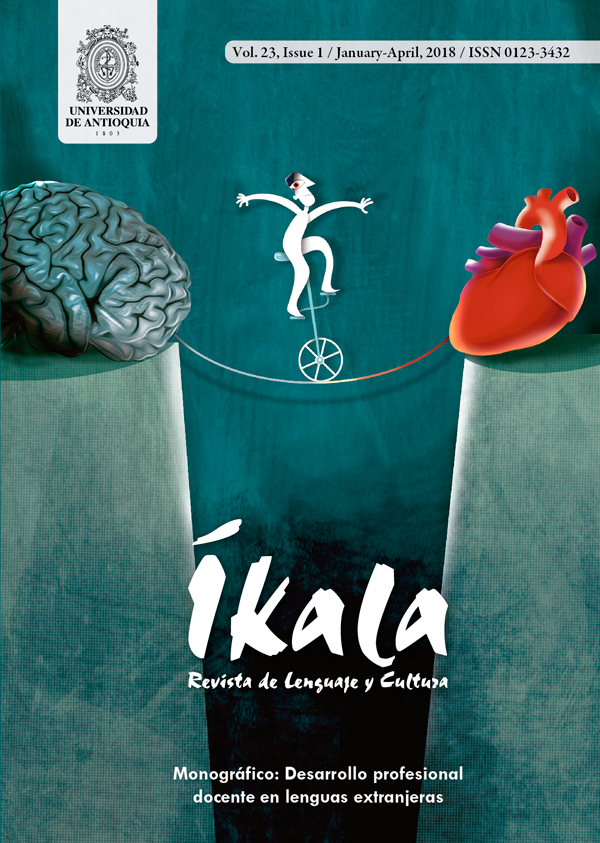Changing teaching practices: The impact of a professional development program on an English teacher
DOI:
https://doi.org/10.17533/udea.ikala.v23n01a08Keywords:
teacher learning, learning communities, professional development, changing teaching practice, English teachers.Abstract
Professional development programs in the form of learning communities offer teachers the possibility to improve their practice and support them in accomplishing the demands that the government and society have assigned them when these are well designed and developed. The study reported here focused on understanding how an English teacher changed her teaching practice with the support of a facilitator in a teacher learning community. Data was gathered through interviews, class observations, recorded meetings and teachers’ planning units and pedagogical materials. Results indicate that the teacher experienced changes in her teaching practice related to patterns of teaching behavior and teaching methodology. However, there were some aspects of these two components that she changed only to a certain extent. Moreover, she underwent some difficulties with students and with some contextual factors that affected her learning process. This study reveals several contributions that a learning community can offer to in-service teachers to improve their teaching practice.
Downloads
References
Anderson, G. L., Herr, K., & Nihlen, S. A. (1994). Studying your own school: An educator’s guide for qualitative practitioner research. Thousand Oaks, CA: Corwin Press.
Ball, D. L., & Cohen, D.K. (1999). Developing practice, developing practitioners: Towards and practice-based theory of professional education. In: L. Darling-Hammond & G. Sykes (Eds.), Teaching as the learning profession: Handbook of policy and practice. San Francisco, CA: Jossey-Bass.
Borko, H. & Putnam, R. (1996). Learning to teach. In D. Berliner & R. Calfee (Eds.), Handbook of educational psychology. (pp. 673-708). New York, NY: Macmillan.
Burnaford, G., Fischer, J., & Hobson, D. (2001). Teachers doing research: The power of action through inquiry. Mahwah, NJ: Lawrence Erlbaum Associates.
Cadavid, C., Quinchía, D., & Díaz, C. (2009). Una propuesta holística de desarrollo profesional para maestros de inglés de la básica primaria. IKALA. Revista de Lenguaje y Cultura, 14 (21), 135-158.
Cochran-Smith, M., & Lytle, S. L. (1999). Relationships of knowledge and practice: Teacher learning in communities. Review of Research in Education, 24, 249-305.
Cochran-Smith, M., & Lytle, S.L. (2001). Beyon certainty: Taking an inquiry stance on practice. In: A. Lieberman, & L. Miller (Eds.), Teachers caught in the action: Professional development that matters. New York, NY: Teachers College Press.
Chaves, O., & Guapacha, M. E. (2016). An eclectic professional development proposal for English language teachers. PROFILE Issues in Teachers’ Professional Development, 18(1), 71-96.
Fessler, R. (1995). Dynamics of teacher career stages. In: T.R. Guskey & M. Huberman (Eds.), Professional development in education: New paradigms and practices. New York, NY: Teachers College Press.
Fullan, M. (2001). The new meaning of educational change (3rd Ed.). New York, NY: Teachers College Press.
Giraldo, F. (2014). The impact of a professional development program on English language teachers’ classroom performance. PROFILE Issues in Teachers’ Professional Development, 16 (1), 63-76.
Grossman, P., Wineburg, S. & Woolworth, S. (2001). Toward a theory of teacher community. Teachers College Record, 103 (6), 942-1012.
Hawley, W.D., & Valli, L. (1999). The essentials of effective professional development: A new consensus. In L. Darling-Hammond & G. Sykes (Eds.), Teaching as the learning profession: Handbook of policy and practice. San Francisco, CA: Jossey-Bass.
Hoban, G. F. (2002). Teacher learning for educational change: A systems thinking Approach. In I. Goodson & A. Hargreaves (Eds.), Teacher learning for educational change. Buckingham: Open University Press.
Huberman, M. (1989). The professional life cycle of teachers. Teachers College Records, 91 (1), 31-57.
Huberman, M. (1995). Professional careers and professional development: Some intersections. In T.R. Guskey & M. Huberman (Eds.), Professional development in education: New paradigms and practices. New York, NY: Teachers College Press.
Lieberman, A., & Miller, L. (2014). Teachers as professionals: Evolving definitions of staff development. In L. Martin, S. Kragler, D. Quatroche, & K. Bauserman (Eds.), Handbook of professional development in education: Successful models and practices, prek-12. New York, NY: The Guilford Press.
Little, J. W. (2003). Inside teacher community: Representations of classroom practice. Teachers College Record, 105 (6), 913–945.
Long, R. (2014). Federal investments in professional development: What do 50 years of experience tell us about what it takes to make a difference? In L. Martin, S. Kragler, D. Quatroche, & K. Bauserman (Eds.), Handbook of professional development in education: Successful models and practices, prek-12. New York, NY: The Guilford Press.
McLaughling, M. W., & Talbert, J. E. (2001). Professional communities and the work of high school teachers. Chicago, IL: The University of Chicago Press.
McLaughling, M.W., & Zarrow, J. (2001). Teachers engaged in evidence-based reform: Trajectories of teachers’ inquiry, analysis, and action. In A. Lieberman & L. Miller (Eds.), Teachers caught in the action: Professional development that matters. New York, NY: Teachers College Press.
Reutzel, D.R., & Clark, S. K. (2014). Shaping the contours of professional development, prek-12: Successful models and practices. In L. Martin, S. Kragler, D. Quatroche, & K. Bauserman (Eds.), Handbook of professional development in education: Successful models and practices, prek-12. New York, NY: The Guilford Press.
Richardson, V, & Placier P. (2001). Teacher change. In V. Richardson (Ed.), Handbook of research on teaching (4th Ed.). (pp. 904-947). Washington, DC: AERA.
Sierra Piedrahita, A.M. (2016). Contributions of a social justice language teacher education perspective to professional development programs in Colombia. PROFILE Issues in Teachers’ Professsional Development, 18 (1), 203-217.
Stake, R. E. (2000). Case study. In N. Denzin & Y. Lincoln (Eds.), Handbook of qualitative research. (2nd ed.). Thousand Oaks, CA: Sage.
Stake, R. E. (2005). Qualitative case studies. In N. Denzin & Y. Lincoln (Eds.), Handbook of qualitative research. (3rd ed.). Thousand Oaks, CA: Sage.
Stake, R. E. (2006). Multiple case study analysis. New York, NY: The Guildford Press.
Published
How to Cite
Issue
Section
License
Copyright (c) 2018 Íkala

This work is licensed under a Creative Commons Attribution-NonCommercial-ShareAlike 4.0 International License.












